Fiction
The Hunted. By Albert J. Guerard. (Longmans. • 9s. 6d.)
NOTHING outstanding this week : three readable novels which fail to raise the critical pulse but will serve to mark the time till something more noteworthy appears. Mr. Guerard -writes convincingly of life in an American university town, Mr. Armstrong gives us the authentic feeling of a tramp steamer in the Arctic, while Mr. Marshall is charming and whimsical against the background of occupied Vienna.
In The Hunted, John Richmond, a disorganised, thirty-three-year- old English instructor—" the perfect Oxford don, unchangeable, insulated against experience "—a poet whose early promise has been dithered away in a comfortable, aimless academic life in the U.S.A., marries a waitress, Claire, who epitomises the good, sound human qualities. She has a poor time among the professors' wives, who spot at once that she is not a lady and hound her into vexed frustra- tion in their attempts to pry into her origins and background. When the winter floods rise in the surrounding countryside, the entire university joins in a nauseating man-hunt for an escaped criminal known as " the Bomber," who has previously been lionised in the decadent college fraternities to which he has been introduced by one Charles Selwyn, a soulless intellectual of the Stavrogin family and a friend of John's. " The Bomber " takes shelter with Claire, who feels that his hunted condition parallels her own, but she is betrayed to the police by her faithless and jealousy-ridden husband, who has proved miserably unable to sustain the marriage relationship. The book ends with Claire walking right out on the whole bunch to get a job in a factory. Mr. Guerard tells a good story and sketches character well ; his picture of the university community is horribly convincing, and John seems drawn from the life. If his novel is nevertheless unsatisfying it is because of a deficiency he shares with 99 per cent. of novelists—in artistry and imagination. It doesn't go deep, but it is really readable. So is The Northern Maid. A ramshackle cargo-boat loses her beloved and capable master at Archangel. The corpse is stowed in the lazaret, and the first mate, Bassett, a stolid and outwardly com- posed man suffering nevertheless from the sacrifice of his existence to the maintenance of a false image of himself, is appointed by the owners to take command and to bring the cargo of timber as quickly and cheaply as possible to Rotterdam. To save pilotage he puts 'the ship on the risky deep-sea course and, failing to heed the warn- ings of the experienced and bitter old second mate, Macfarlane, runs her into a vicious storm. The engine is damaged and stops. Against Macfarlane's advice, Bassett has a try-sail rigged, and loses a man's life. Finally, there is no alternative but for Bassett himself to sacri- fice his life in an attempt to free the deck7load. He finds his true self, does so, and the book closes with his death. I found the story absorbing. Mr. Armstrong shows his characters, from captain to carpenter, responding to a decisive testing of their manhood in this ordeal by water. In the circumstances it is perhaps not a serious defect that his psychology, though penetrating, is primitive. The whole story is primitive, elemental and gripping. Nothing to-rave about, but a genuine and sincere work on its own level, which one can recommend- to all lovers of the sea.
An embarrassed air of ineffectual good intention hangs over The Red Danube, which concerns a nice middle-aged English colonel's attempts to sort out the problem of world chaos. In post-war Vienna he is billeted in a convent with such a nice lot of nuns, and they have nice discussions about religion, and charitableness, and the Pope, and so on. There is a muddle when the Russian authorities demand the handing-over of a ballet-dancer, Maria Biihlen,,who is hiding in the nunnery. The Colonel connives at her escape to the British zone, but his substitute later hands her to the Russians, and there is a touching scene when Maria, having shot herself rather than return, dies in the convent, holding hands with the English officer who romantically loves her; Twingo. Most of the characters have odd, whimsical, affectionate nicknames like Twingo, Blinker, Hooky or Pinky ; it is as if Mr. Marshall sees them simultaneously as tough executives of an occupying army and as quaint little elves or pixies from J. M. Barrieland. Maria herself is a beautiful fairy doll, and her death like nothing so much as Tinkerbell's in Peter Pan. One expects at any moment a confiding-tippe.aling aside from the author : " Do you believe in fairies? " The book nowhere directly describes the state of Europe, and the only Austrian character apart from the nuns and the soldier-brother of one of them is a little girl the Colonel encounters twice in the street. A strange compound of the childish and the adult, the actual and the make-believe : as for the state of the world, Mr. Marshall seems almost to imply, it's pretty terrible, but perhaps if we all really did believe in fairies. . . ?
D. S. SAVAGE.






























 Previous page
Previous page